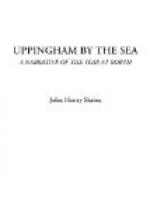If we were little worse off than at home in the appliances for games, there were other recreations which were proper to the place, and clear gain to the immigrants. For example, the fishing in the Lery, along whose banks groups of anglers might be seen strolling, whipping the water to the full entertainment of themselves and the fish, or now and then blessing Sir Pryse, as the angler landed his first trout from our good friend’s waters. Yet we had our old sportsmen too, who could kill trout as well as amuse themselves, and bring home a delicate dish for a half-holiday tea. For masters, there was a little shooting to be had on the land of some friendly neighbours; and on the no-man’s-land of the coast, a variety of sea-fowl fell to our guns, and were stuffed to enrich our museum with a “Borth Collection.” We must not forget the Rink at Aberystwith, for which parties used to be formed on half-holidays; nor the Golf, which the long strip of rough ground along the shore tempted us to introduce. The “links” were famous in extent and variety of ground, but the game, in spite of patronage in high quarters, did not become popular. There were also recreations of a more intellectual kind: archaeological visits to “British camps,” or others of those Cymric monuments, which were just then provoking Lord F. Hervey’s incomprehensible spleen; scientific rambles in quest of rare shells, seaweeds, or the varieties of a new flora; and rambles, half-scientific, half-predatory, along the woody cliffs of the Lery, whence adventurers would return with news of a hawk’s nest discovered, but not reached, or the more substantial result of snakes, and such venomous “beasties,” captured and brought home in a bag. The rocks under Borth Head were good hunting-grounds, and supplied sea-monsters for an aquarium, which the Headmaster built and presented to the school. One of the first prizes was a small octopus, which his captor, having no other vessel handy, brought home floating in his cap. In the aquarium, however, spite of this good beginning, we have to record a failure. “The masters could not, and the boys would not, attend to it; and our best octopus, after coming to the top of the water, and spitting a last farewell at sundry lookers-on, died; and with him died the attempt.”
We are quoting from a letter of a correspondent to The Times, and we cannot better conclude this part of the subject than by a graphic paragraph from the same hand:
Again, there were the birds, many always on shore and marsh; but when the herring-fry passed up the bay the birds positively possessed it. There was a wilderness of glistening wings in the air, a restless bank of floating feathers on the sea—a mile of wings and glancing foam of life, with many a strange wild cry, giving the high notes to the deep bass of the waves. How often from the marsh, or somewhere, dreamland or ghostland, came the plaintive wail of the curlews; then the dotterels would run and flit about the




